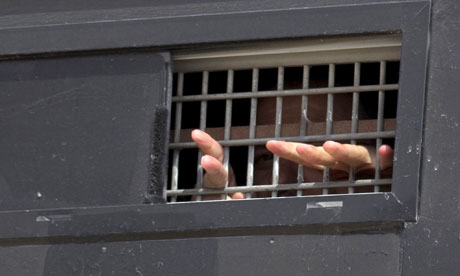
(AFP Photo)
An end of year report by the El Nadeem Center for Rehabilitation of Victims of Violence has documented an apparent spike in torture and abuse across Egyptian prisons in 2014, recording at least 100 deaths in custody.
According to the report, the majority of deaths are due to torture, denied medical care and severe detention conditions. The centre however believes that the true scale of death in prisons is much higher than the evidence they were able to collate.
In the strongly worded document, El Nadeem Center urged the government to take responsibility for the health and treatment of detainees in Egyptian custody.
“You are responsible for all of them — whether they died from electric shocks or brutal beatings; or died from hunger as a result of a hunger strike that you ignored; or died of suffocation because of overcrowding; or of diseases that you delayed treatment for, or because you refused to transfer them to hospitals,” the report said.
“In all cases, their deaths are premeditated murder in your prisons,” the centre continues, “and you will be held accountable for it sooner or later.”
According to Daily News Egypt research, an estimated 95 individuals died in places of detention across Egypt between February 2011 and the unseating of the Muslim Brotherhood regime in June 2013. However, from January until November 2014, at least 52 died in centres across Cairo and Giza, according to the governmental Forensic Medicine Authority.
Article 55 of the constitution, ratified by a popular referendum in January 2014, mandates that “every person who is either arrested, detained, or his freedom is restricted shall be treated in a manner that maintains his dignity. He/she may not be tortured, intimated, coerced, or physically or morally harmed”.
However, institutionalised torture has long been a widespread issue inside Egyptian detention facilities, regularly making headlines in recent weeks.
On 31 December, the Egyptian Coordination of Rights and Freedoms reported that a 16-year-old boy accused of robbery died due to torture during detention. Mahmoud Moataz Fathallah was being held at Khanka police station in Qaliubiya.
Also in December, the Salafi-leaning Ahrar movement reported the death of Cairo University teaching assistant Abdel Rahman Kamel at Al-Azouly prison due to injuries sustained from torture. Al-Azouly military prison, often referred to as “Egypt’s Abu Ghraib”, is believed by rights groups, such as Amnesty International and Human Rights Watch, to be holding hundreds of undocumented detainees who are routinely subjected to severe torture, such as electrocution and beatings, beyond formal judicial oversight.
Following the US government’s report on CIA torture in December, the Egyptian rights group National Council for Human Rights (NCHR) announced that it will follow up the liability of Egyptian authorities for illegal abuse of detainees. Whilst the report did not directly mention Egypt’s role in the outsourced torture of suspected terrorists during the Bush administration’s ‘War on Terror’, the cooperation is well documented and referenced indirectly in the Senate report. NCHR spokesperson Hafez Abu Seada told Daily News Egypt that his organisation will work towards collecting testimonies of abuse and push the government to launch investigations into the abuses.


